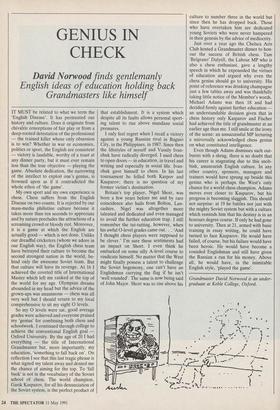GENIUS IN CHECK
David Norwood finds gentlemanly
English ideas of education holding back Grandmasters like himself
IT MUST be related to what we term the `English Disease'. It has permeated our history and culture. Does it originate from chivalric conceptions of fair play or from a deep-rooted detestation of the professional — the trained killer whose only obsession is to win? Whether in war or economics, politics or sport, the English are consistent — victory is laudable, worthy of a toast at any dinner party, but it must ever remain less than the true objective — playing the game. Absolute dedication, the narrowing of the intellect to exploit one's genius, is frowned upon as if it contradicted the whole ethos of 'the game'.
My own sport and my own experience is chess. Chess suffers from the English Disease on two counts. It is rejected by our mass-media philistine culture because it takes more than ten seconds to appreciate and by nature precludes the attractions of a screaming crowd or bloody riot. Moreover, it is a game at which the English are actually good — which is not done. Unlike our dreadful cricketers (whom we adore in our English way), the English chess team have betrayed their culture to become the second strongest nation in the world, be- hind only the awesome Soviet team. But that culture will have its revenge. At 16 I achieved the coveted title of International Master which left me ranked at the top of the world for my age. Olympian dreams abounded in my head but the advice of the grown-ups was unanimous — chess was all very well but I should return to my local comprehensive to sit my eight 0 levels.
So my 0 levels were sat, good average grades were achieved and everyone praised my 'genius' for combining both chess and schoolwork. I continued through college to achieve the conventional English goal Oxford University. By the age of 20 I had everything — the title of International Grandmaster but, more importantly, my education, 'something to fall back on'. On reflection I see that this last tragic phrase is what signed my talent away and denied me the chance of aiming for the top. To 'fall back' is not in the vocabulary of the Soviet school of chess. The world champion, Garik Kasparov, for all his denunciation of the Soviet system, is the perfect product of that establishment. It is a system which despite all its faults allows personal sport- ing talent to rise above mundane social pressures.
I only feel regret when I recall a victory against a young Russian rival in Baguio City, in the Philippines, in 1987. Since then the lifestyles of myself and Vassily Ivan- chuk have radically diverged. I used chess to open doors — in education, in travel and writing and especially in social life. Ivan- chuk gave himself to chess. In his last tournament he felled both Karpov and Kasparov; there is no question of my former victim's destination.
Britain's top player, Nigel Short, was born a few years before me and by rare coincidence also hails from Bolton, Lan- cashire. Nigel was altogether more talented and dedicated and even managed to avoid the further education trap. I still remember the tut-tutting, however, when his awful 0-level grades came out. . . 'And I thought chess players were supposed to be clever.' I'm sure these sentiments had an impact on Short. I even think he embarked on some silly A-level course to vindicate himself. No matter that the West might finally possess a talent to challenge the Soviet hegemony, one can't have an Englishman carrying the flag if he isn't 'well rounded'. The same is now being said of John Major. Short was to rise above his culture to number three in the world but since then he has dropped back. Those who have overtaken him are dedicated young Soviets who were never hampered in their genesis by the advice of mediocrity.
Just over a year ago the Chelsea Arts Club hosted a Grandmaster dinner to hon- our the success of British chess. Tam `Belgrano' Dalyell, the Labour MP who is also a chess enthusiast, gave a lengthy speech in which he expounded the virtues of education and argued why even the chess genius should go to university. His point of reference was drinking champagne just a few tables away and was thankfully taking little notice of the Member's words. Michael Adams was then 18 and had decided firmly against further education an understandable decision given that in chess history only Kasparov and Fischer had achieved the title of grandmaster at an earlier age than me. I still smile at the irony of the scene: an unsuccessful MP lecturing a universally acknowledged chess genius on what constituted intelligence.
Even though Adams dismisses such out- bursts with a shrug, there is no doubt that his career is stagnating due to this snob- bish, amateurish English culture. In any other country, sponsors, managers and trainers would have sprung up beside this genius who is perhaps the West's only chance for a world chess champion. Adams moves ever closer to Kasparov, but his progress is becoming sluggish. This should not surprise: at 19 he battles not just with the mighty Soviet system but with a culture which reminds him that his destiny is in an honours degree course. If only he had gone to university. Then at 21, armed with basic training in essay writing, he could have turned to face Kasparov. He would have failed, of course, but his failure would have been heroic. He would have become a rounded Englishman and still have given the Russian a run for his money. Above all, he would have, in the inimitable English style, 'played the game'.
Grandmaster David Norwood is an under- graduate at Keble College, Oxford.


























































 Previous page
Previous page